| Srl | Item |
| 1 |
ID:
095990
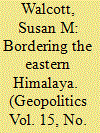

|
|
|
|
|
| Publication |
2010.
|
| Summary/Abstract |
National borders in the eastern Himalaya region exhibit pressures of modernisation transition between two powerful emerging nation-states. The research question concerns under what circumstances borders are maintained. Consideration falls on the role of physical features, borders as cultural identity markers, and passes as transgressive spaces, negotiated through historical shifts in population and politics. A geopolitical history of boundary contestations in this region indicates the role of passes as conduits of political and cultural flows. Power relations bound space that cultural preservation makes worth delimiting.
|
|
|
|
|
|
|
|
|
|
|
|
|
|
|
|
| 2 |
ID:
095988
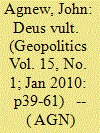

|
|
|
|
|
| Publication |
2010.
|
| Summary/Abstract |
The Catholic Church is a religious tradition with a highly centralised organisational structure which operates worldwide but that must adjust itself to and effectively operate in local and world-regional contexts that can often challenge and threaten to subvert its central doctrines, operational principles, and political compromises with secular authorities. The Church has long provided the source and model, with its base in the sacred origins of sovereignty, for a quintessentially Western statehood. In this context, I wish to raise three points for further discussion using the significant example of the Catholic Church that future research on the contemporary confluence between religion and geopolitics should address. The first is whether a church can have "geopolitics." I answer in the affirmative with a number of arguments for doing so. The second is the idea, made in writing and in his practice by Pope Benedict, that Western civilisation is in crisis and that only a restoration of a historic Christendom (Europe) based on a reinvigorated Catholic Church can save it. I dispute the strategy of "hard" or coercive power and the focus on Europe he has apparently chosen as departing from what has often best served the Church in the past. Third, and finally, in the global struggle for souls, numbers matter. Somewhat akin to the struggle for primacy between states in the modern geopolitical imagination, the struggle for souls between faiths (Catholics and Protestants, Moslems and Christians, etc.) is once more in ascendance. But doesn't this quantitative emphasis risk subverting the Church's post-Vatican II emphasis on Christian practice in everyday life? The overall purpose of the article is to introduce religious organisation and associated theological claims into the problematic of geopolitics using the case of the world's largest Christian denomination.
|
|
|
|
|
|
|
|
|
|
|
|
|
|
|
|
| 3 |
ID:
095995


|
|
|
|
|
| Publication |
2010.
|
| Summary/Abstract |
This article analyses the ingredients of empire as a pattern of order with geopolitical effects. Noting the imperial form's proclivity for expansion from a critical reading of historical sociology, the article argues that the principal manifestation of earlier geopolitics lay not in the nation but in empire. That in turn has been driven by a view of the world as disorderly and open to the ordering will of empires (emanating, at the time of geopolitics' inception, from Europe). One implication is that empires are likely to figure in the geopolitical ordering of the globe at all times, in particular after all that has happened in the late twentieth century to undermine nationalism and the national state. Empire is indeed a probable, even for some an attractive form of regime for extending order over the disorder produced by globalisation. Geopolitics articulated in imperial expansion is likely to be found in the present and in the future - the EU, and still more obviously the USA exhibiting the form in contemporary guise. This does not mean that empires figure in geopolitics simply by extending their own order, however; they are at least as much purveyors of other dynamics and orders, which possess their own discrete effects. The article ends with stipulations regarding the variety of forms that empires may take: neither fully bounded nor centred; neither straightforwardly self-serving nor easily made legitimate.
|
|
|
|
|
|
|
|
|
|
|
|
|
|
|
|
| 4 |
ID:
096000


|
|
|
| 5 |
ID:
095993
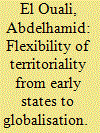

|
|
|
| 6 |
ID:
095999


|
|
|
| 7 |
ID:
095987
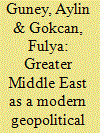

|
|
|
|
|
| Publication |
2010.
|
| Summary/Abstract |
This article aims at analysing how the September 11 terrorist attacks have caused the formation of a new geopolitical vision of an area called the 'Greater Middle East' and how this formation has led to changes in US foreign policy towards this region. To do that, the article first presents a theoretical background against which the modern geopolitical imagination of the USA is formulated. It considers the links between national traumas/myths, geopolitical codes and visions, and foreign policy actions. The article then applies this analysis to the case of the Greater Middle East with respect to how this imagined geography shapes the foreign and security policy of the USA. It concludes that even though this imagined region has been presented in texts as justifying US-led policies with liberal underpinnings, it has in reality laid the ground for and been used for justifying US extra-territorial intervention in the region.
|
|
|
|
|
|
|
|
|
|
|
|
|
|
|
|
| 8 |
ID:
095984


|
|
|
|
|
| Publication |
2010.
|
| Summary/Abstract |
The announcement that the Russian state-owned gas monopoly Gazprom and two German energy companies intend to construct a new undersea Baltic pipeline that will bypass Poland has raised a fierce political storm in that country. In this paper, we aim to shed further light onto the forces that govern the proposed pipeline's interaction with Poland's energy, economic and geopolitical landscapes, by examining some of the public discourses and state policies that have been associated with the country's reaction to it. One of our key findings is that the new gas link - recently named Nord Stream - is creating interlocking webs of socio-spatial paradoxes and contradictions that reverberate across the entire Baltic space. In the process, they simultaneously bind together and tear apart the territorial and political fabric of the region.
|
|
|
|
|
|
|
|
|
|
|
|
|
|
|
|
| 9 |
ID:
096005


|
|
|
| 10 |
ID:
096003
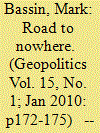

|
|
|
| 11 |
ID:
095997


|
|
|
| 12 |
ID:
096002


|
|
|